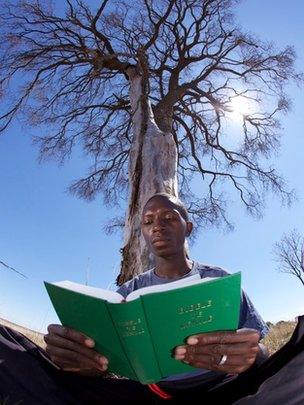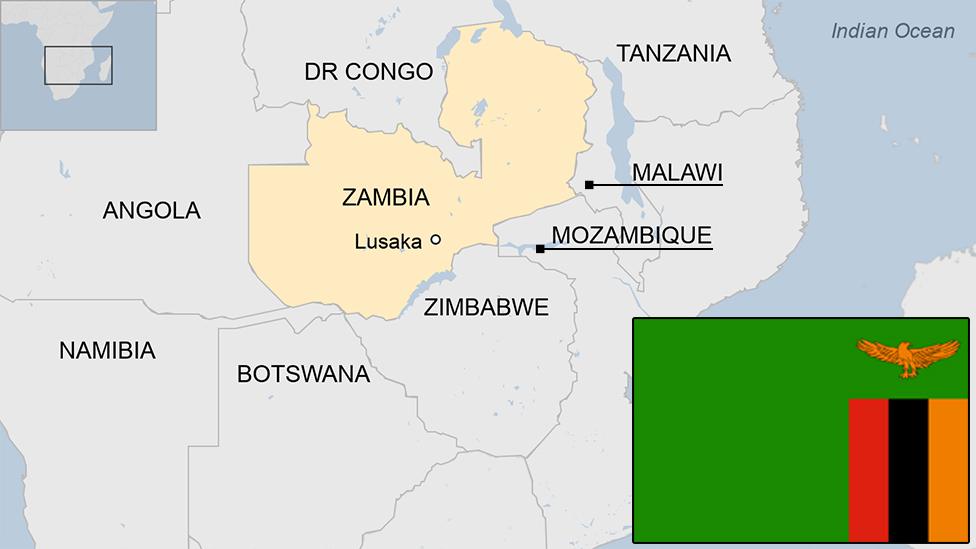Zambian farmers learn to write their Shanjo language
- Published

The group is also working on translating the Bible into ciShanjo
"It's like a miracle," says Hastings Sitale, recalling how he felt when he saw a booklet written in ciShanjo, a language he had only ever spoken before.
Mr Sitale, who describes himself as "just a farmer", is part of an estimated 20,000-strong Shanjo community in Zambia's remote Western Province.
Over the last few months, he has been part of a group of amateur linguists, mostly fellow farmers, who have been creating a spelling system for their mother tongue.
For the first time stories passed down through the generations by word of mouth are being written down.
"We decided to do this so, as the older people die away, the younger people will see the language," Mr Sitale told the BBC World Service.
'Sheer excitement'
Mr Hastings and his team of village translators are one of five teams developing a written language for their tongues in the Western Province.
They attend translation workshops in the regional capital Mongu - a round trip which can take up to 32 hours, travelling by oxen, car and bus.
Oxen also formed an important part of their inaugural session with Paul Tench, a retired linguist from Cardiff University, who helped the Shanjo team begin their project in July.
"Their sheer excitement was wonderful to behold," he said.
The first task was to record a sample of the language which could be used for a dictation exercise.
So Mr Tench asked the team to think of a story and decide who should tell it; they elected one member who described the importance of training oxen for effective farming in ciShanjo.
Individually they all wrote down the story, after which they compared their efforts.
But they mostly agreed, according to Mr Tench.
"All of these people were literate in the [local] trade language siLozi and English; they knew from these languages the consonants and vowels of the Latin alphabet and what they stood for in those two languages.
"They applied this as best they could to the sounds of the words in their own language.
"Then they discussed things together in their mother tongue to agree solutions to any problems that arose. I kept a tally of the letters used and arranged them in a chart that reflected phonetic patterns."
Isolation
A spelling system emerged as the exercises continued. After two weeks, a 27-page booklet on how to read and write ciShanjo was produced, which included a 500-word dictionary, some grammar notes and three short pieces they had studied.
The original request for the translation initiative was made by Christian church groups who complained that many in their congregations were unable to understand the Bible written in siLozi, and missionary groups sponsored Mr Tench's trip.
Since then, James Lucas, a Christian missionary based in Zambia, has continued to co-ordinate the language translation project, helping the Shanjo and four other ethnic groups.
"The languages in the Western Province are quite similar, go back 150 years and many of them come from the same language," says Mr Lucas.
But that changed over time because they live so far apart, leaving some minority languages very isolated.
It is a pattern partly mirrored at the continental level, according to Mr Tench: Africa has about 15% of the global population but between them Africans speak 30% of the total number of languages in the world.
Zambia alone has more than 70 languages; the official national language is English.
'Forest people'
Nancy Kula, who lectures in Linguistics at the University of Essex, says the Western Province is probably the most linguistically diverse region in Zambia.
"CiShanjo, like many other languages of the Western Province, is very much under threat of extinction," she warns, saying it is difficult to say how many languages have become extinct in Zambia recently.
"The situation is very under-investigated and I fear the real situation is probably even worse than anticipated."
Part of the problem is the influence of English and siLozi in the area - siLozi is the lingua franca for speakers of ciShanjo travelling or trading in the Western Province.
But many Shanjo cannot understand siLozi and even when they do attempt to speak it, they are teased by townsfolk because of their accents.
"They call us people from the bush or forest people," says Carol Mushali, who is the only woman on the ciShanjo translation team.
She sees the potential for primary school lessons using ciShanjo now that siLozi and English can be translated in written form because, many researchers say, children learn best in their mother tongue.
There are also benefits for adults learning this new form of their language.
"Once they taste a bit of knowledge they want more. It opens up learning to take place - a foundation that teaches them to read and write opens up the mind to further learning of every type," says Ms Mushali.
'On the map'
Isilimwe Limakazo, 25, is the youngest person to take part in the translation project.
He says the experience of taking part has led him to "want to only use the Shanjo language every day".
He sees a bright future for the language.
"Even my friends are cutting songs and videos in ciShanjo… before when they were singing, they used to make mistakes but now because they have learned to read and write the language properly, if they produce another album, then it will be better than before."
Enoch Walubita, another farmer and translator on the project, is similarly enthused.
"The advantage of this project is our people will be exposed - on the map."
"We were thinking we are nobody, but now we are the same as everyone in the world."
- Published24 March 2023
